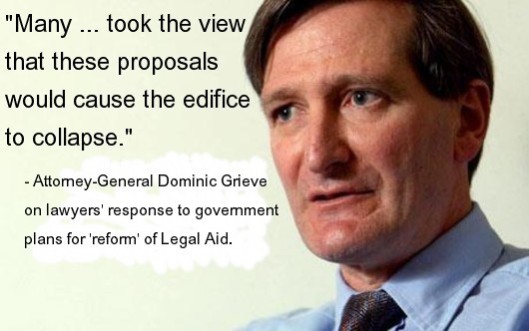Reblogged from Vox Political:

It seems the Secretary of State for Justice – Chris Grayling – cannot rely on the support of his own Attorney-General over his plans to stop people who need Legal Aid from getting it.
Dominic Grieve (for it is he) has written to barristers concerned about the Ministry of Justice’s proposals. In this letter, it appears clear that he is entirely unenthusiastic about the proposals – inconsistent with his membership of the same government as Grayling.
I am grateful to Jack of Kent for the following analysis.
The letter notably contains no words that could be described as an endorsement of the proposals. He accepts that opposition to the proposals cannot be explained away by self-interest, acknowledging that there is serious and principled opposition to the proposals which cannot be attributed to mere selfishness.
And the last sentence suggests that the Attorney-General is not personally confident that the Lord Chancellor is capable of making a fully informed decision, indicating that the government’s own senior law officer does not believe that the Ministry of Justice will make a policy decision on an appropriate evidential basis.
Here is the text of the letter in full (it can be found on the Internet here).
“A number of you wrote to me on 4th June drawing to my attention concerns about the Ministry of Justice proposals for the reform of legal aid. From regular attendance at Bar Council meetings I am well aware of the deeply and sincerely held concerns the Bar has on the effect these proposals, if implemented, will have. I recognise that those concerns go beyond the personal, financial implications to individual members of the Bar – serious though those may be – but extend to the potential impact on the quality of the justice system this country is rightly proud of.These proposals would cause the edifice to collapse. That’s what some of us have been saying all along.
“The Consultation paper meeting was one of the main topics for consideration at the Bar Council meeting of 20th April. I was asked to speak at the close of the Council’s debate. I emphasised that this was a consultation exercise carried out by the Lord Chancellor [Mr Grayling]. He, like other Ministers, had savings that his department had to absorb and where savings are to be made depends on where priorities lay. I said that on the whole, the service provided by the legal profession is taken for granted and that there was a general view that whilst lawyers complained about every financial cut imposed, the edifice will continue to function as it has in the past. I said that it was apparent now, from listening to what had been said at the meeting, that many present took the view that these proposals would cause the edifice to collapse. In my view, it was vital that the Bar use the consultation exercise to explain why these proposals will damage the justice system and what the overall impact will be.
“I know the Bar Council has provided a thoughtful yet powerful response to the consultation – one of many from the Bar. It was important that the consultation was responded to and I am grateful to all who have taken time to write to me and provide me with the particular insights of those who carry out Government work through membership of the Panels.
“Policy in this area is owned by the Lord Chancellor and not me. But I have already spoken to the Lord Chancellor and will continue to draw to his attention the concerns that have been expressed to me. I will endeavour to ensure, as far as I can, that the decision he reaches in due course is a fully informed one.”
What do you think of the Attorney-General’s letter?
Whatever conclusions Grayling reaches, they may become apparent on July 3, when the Commons Justice Committee questions him about his proposals.
Hopefully, these questions will take into account not only the plans themselves, but the Attorney-General’s letter and the concerns which led him to write it, and also news stories demonising legal aid barristers and solicitors as “cashing in” (such as a Sun story last week), featuring supporting comments from Grayling himself.